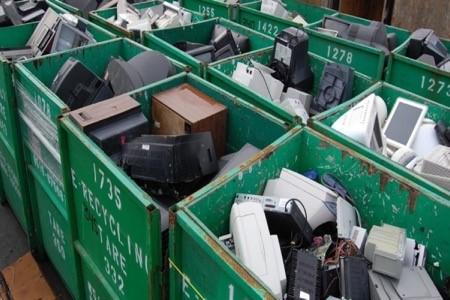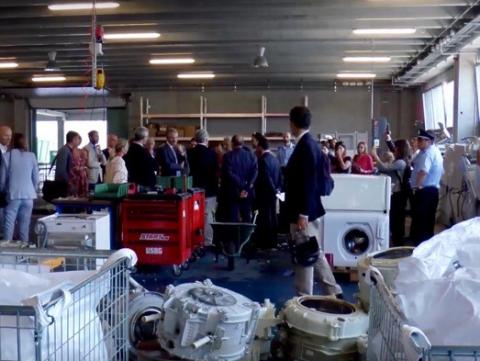A new life for prisoners and valuable resources: the WEEE recovery facility

With current annual growth rates of 2%, European experts are estimating that the generation of waste of electrical and electronic equipment (WEEE) will have climbed to 12 million tons this year. This fast growing waste stream comprises a large variety of consumer goods ranging from washing machines to cell phones. WEEE is a complex mixture of materials and often includes some hazardous content that needs to be managed properly in order to avoid major environmental and health problems. In addition, modern electronics also contain scarce and expensive resources (e.g. around 10% of total gold worldwide is used for their production).
Diverting WEEE from landfill and illegal export
The revised Waste Framework Directive sets clear objectives to boost the rates of separate collection and recycling of WEEE in order to divert it from landfill or illegal export, requiring each Member State to meet a collection target of 65 % of equipment sold or 85 % of electronic waste generated from 2019. But implementation is still lagging behind. In its 2019 Circular Economy Action Plan, the European Commission outlines that only 40% of electronic waste is recycled in the EU and calls for improving the collection and recycling of waste electrical and electronic equipment as a crucial element for establishing a circular economy.
An inspiring, hopeful example for better WEEE recycling is coming from a place that is rather associated with despair: the Bollate Prison in Milan. The good practice mapped by the Interreg Europe CIRCE project has been brought to the attention of the partners by Lombardy Region that is looking for new, innovative ways of increasing the rates for the collection and treatment of WEEE.
Sara Mussetta, from the WEEE Coordination Centre (CDC RAEE) in Milan points out: 'In Lombardy, as well as throughout Italy, we were struggling to achieve the ambitious WEEE targets and looked for innovative approaches to increase WEEE collection and recycling. With projects such as in Milan Bollate, Italy is able to create new opportunities for WEEE recovery whilst at the same time promoting social inclusion and job creation.'
New skills for a life after prison
Almost 1300 inmates are detained in the Bollate Prison which is located just a stone’s throw away from the 2015 Milan Expo. The prison management is determined to bring an article of the Italian Constitution to life: it opens the legal possibility to work on the rehabilitation of prisoners. Bollate has already shown its commitment and experience to this aim, attracting a lot of international attention for innovative projects that support the reinsertion of prisoners into active life once they have left the institution.
Inmates can learn new skills such as taking care of animals in the 'Horses in prison' project or obtaining a hospitality diploma from the in-jail section of the Paolo Frisi Hotel School which is mandatory to work in the InGalera restaurant that opened 2015. The restaurant is the first and only Italian restaurant located inside a jail and open to the public for both lunch and dinner.
In 2018, the new WEEE recovery facility has been added to the prison portfolio of projects. It was co-financed and jointly developed by the Lombardy Region (€ 2 million), the Regional Penitentiary Administration for Lombardy (€ 100,000), and AMSA - the company that manages the plant and trains the detained staff (€ 800,000). At the opening of the plant, Cosima Buccoliero, Deputy Director of the Milan Bollate Prison underlined: 'The recovery plant for electrical and electronic waste offers yet another opportunity for Bollate prisoners to get back on their feet through work. It also demonstrates how a fruitful collaboration between public and private institutions can ultimately lead to social inclusion in a perspective of true sustainability.'

Photo credit: Comune di Milano from www.biancoebruno.it
The project aims to encourage the recovery of WEEE, with a consequent reduction of their environmental impact but also pursues several specific goals to support people in a penal institution:
- The creation of job opportunities for disadvantaged people
- The facilitation of re-entry into legality and an active civil life
- The acquisition of professional and transversal skills
With about 3,000 square meters, the WEEE recovery facility in Milan Bollate has the classical dimensions of any WEEE recovery plant. It has the authorisation to treat 3,000 tons per year of electronic waste and is also equipped with a photovoltaic system for the self-production of green energy. The plant currently employs 5 inmates, with the aim of increasing the number of people involved in the project in the near future.
The waste treatment is carried out on two dismantling lines, the first one dedicated to TVs, monitors and large household appliances such as washing machines and dishwashers (type R2 and R3 WEEE), the other for small household appliances (type R4) such as mobile phones, personal computers and peripherals, audio and video equipment, electric tools and toys.
Photo credits: Sistema Nazionale per la Protezione dell’Ambiente
Thanks to the dismantling activities carried out by the workers, it is possible to recover ferrous and non-ferrous metals (copper, brass, bronze, tin), types of plastic polymers, rubber, as well as electronic components such as boards, hard disks, processors and power supplies.
The example of Bollate demonstrates how WEEE recycling, social inclusion and job creation can go hand-in-hand. The key for the success of the project is indeed the collaboration of the public and private sector towards common goals of WEEE recycling and the creation of opportunities for disadvantaged groups.
Currently, the project promoters in Lombardy are pro-actively encouraging the progressive expansion of the project in Bollate and seek to transfer this excellent good practice and the lessons learnt to other penitentiary institutions throughout Italy. The WEEE facility in prison is also an inspiring solution for the CIRCE project partners who have shown interest in this practice and are looking for ways to transfer it in their own policy framework.
Further information
Good practice on WEEE in prison
Video (in Italian) about WEEE in Bollate Prison
